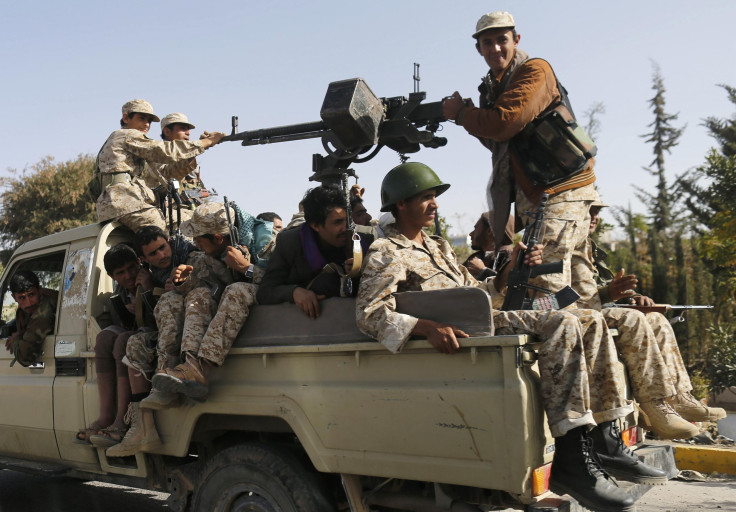Yemen 'Coup' A Sign Of Expanding Iranian Influence In the Middle East

Yemen’s collapsing political situation offers Iran a strategic opportunity to extend its influence into the backyard of its regional archrivals, the Saudis. Shiite Houthi insurgents, widely believed to be backed by Shiite Iran, maintained their grip on the Yemeni capital Sanaa Thursday, a day after seizing control of the presidential palace and reportedly forcing President Abd-Rabbu Mansour Hadi to concede to demands for constitutional changes and a power-sharing deal with the rebel group.
In a day of rapidly changing and confusing developments, Agence France-Presse reported Thursday afternoon that the parliament had rejected Hadi's resignation and would meet Friday.
The group’s effective takeover of the Yemeni government marks a significant victory for Iran over its greatest regional rival (along with Israel) -- Saudi Arabia. And it could prove to be a geopolitical boon for Tehran as Yemen’s strategic location at the mouth of Red Sea could help it gain regional influence. Saudi Arabia and Iran have competed for influence across the region for decades, most notably in recent years in Syria, where the Iranian-backed Bashar Assad regime is battling a number of Sunni rebel factions supported by the Gulf states. Saudi Arabia has long considered Yemen its “back yard” and has historically weighed heavily on its politics.
“The Houthis are Iran’s proxy in its confrontation with the Saudis,” said Farea al-Muslimi, a visiting scholar at the Middle East Center at the Carnegie Endowment for International Peace in Washington, in a telephone call Wednesday from Sanaa.
Yemen shares a 1,000 mile-long desert border with Saudi Arabia that has previously been used by militants to mount efforts to topple the kingdom, prompting a multibillion-dollar effort by the Saudi government to strengthen the border and construct an elaborate defense network. The prospect of a Shiite-controlled state flanking its southern border region is "obviously" something the Saudis will not want, said Ghanem Nuseibeh, a Middle East analyst and partner at Cornerstone Global associates in London.
The deteriorating security and political situation in Yemen has made it an easy target for Iranian intervention. The impoverished nation has been plagued by an al Qaeda Sunni insurgency, tribal and separatist conflicts, and escalating sectarian and economic crises in recent years. “Yemen has been a failing state for many years, and the situation on the ground now is ripe and conducive to this sort of Iranian response,” Nuseibeh said.
Amid the chaos, the Houthis have emerged as one of the strongest forces in the country. Houthi rebel fighters, led by the Shiite leader Abdel-Malek al-Houthi, have accused the president of seeking to bypass a power-sharing deal signed after their seizure of Sanaa last fall and have threatened to take “any means necessary” to push the government to implement the plan, which would grant the group participation in all military and state bodies, according to Reuters.
Gaining a foothold in the impoverished, chaotic state has benefits for Iran beyond the pressure it places on Saudi Arabia, said Nuseibeh. A Shiite-controlled government in Yemen could give Iran access to the Red Sea, marking the "first, if not only, sea access to the Shiites in the Gulf," he said.
Backing disenfranchised Shiite populations has been a crucial component of Iran's strategy to build influence in the oil-rich region. An Iranian official confirmed this point in September following the Houthis’ seizure of Sanaa, telling Reuters, "Everything is about the balance of power in the region. Iran wants a powerful Shiite presence in the region, that is why it has got involved in Yemen."
While Yemen may not offer the same financial incentives as the banking-oriented Bahrain, whose repressed Shiite majority Iran has supported against the country's Saudi-backed Sunni rulers, its geostrategic position at the crossroads between the Middle East, Africa and the Indian Ocean nonetheless could be attractive to Iran, said Nuseibeh. Iran has previously used its control of the Strait of Hormuz, the narrow passage between the Persian Gulf and the Gulf of Oman through which 40 percent of the world’s seaborne oil exports pass, to add pressure to its international diplomatic objectives.
Iran is currently in talks with Western governments about a nuclear deal that could lift international sanctions against it. The situation in Yemen could actually bolster Iran’s position by giving it additional international leverage. Amid growing global concern about the situation in Yemen, which plays host to one of the most aggressive al Qaeda factions in the region, Iran now has a “strong card” to play as an increasingly powerful regional player, Nuseibeh said.
“The Iranians are proving on a daily basis that they are more formidable and stronger than others in the region would hope they are,” Nuseibeh said. “They are showing gradually that they have aspirations of furthering their position as a regional power, and that certainly is the case now.”
© Copyright IBTimes 2024. All rights reserved.






















